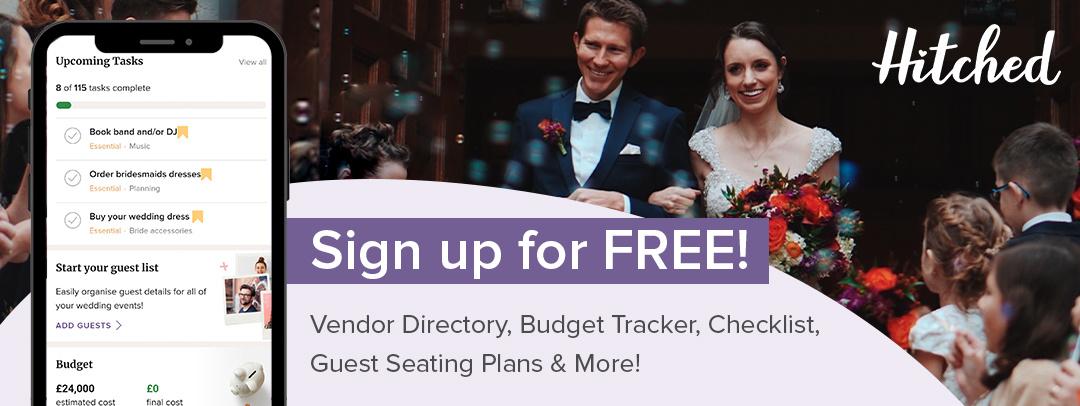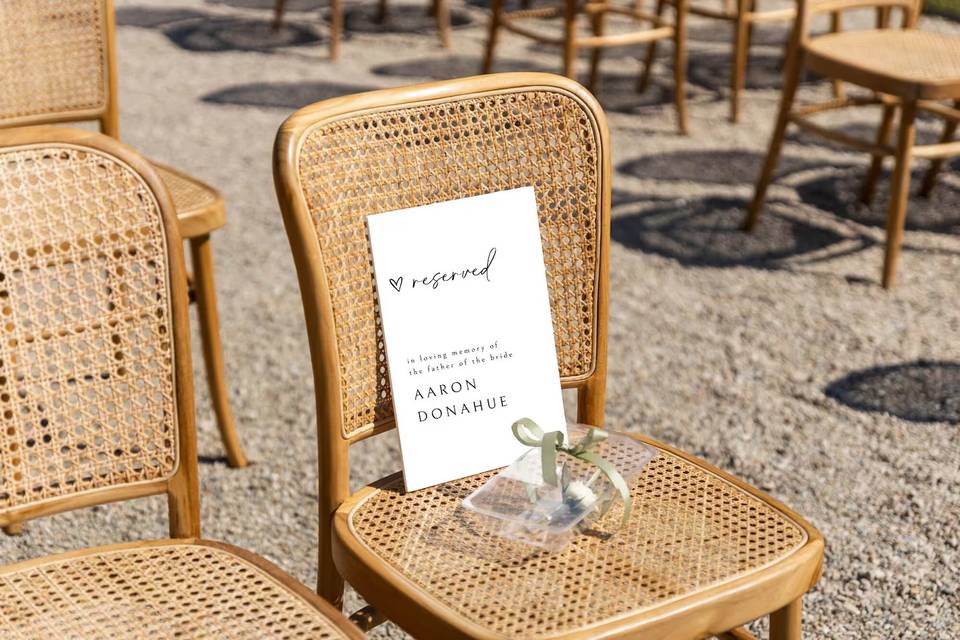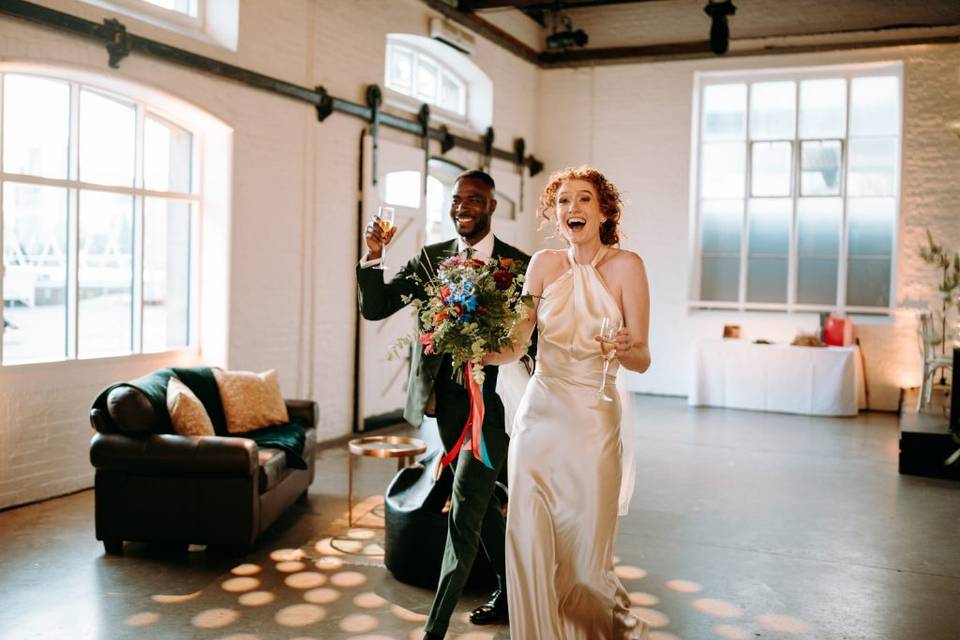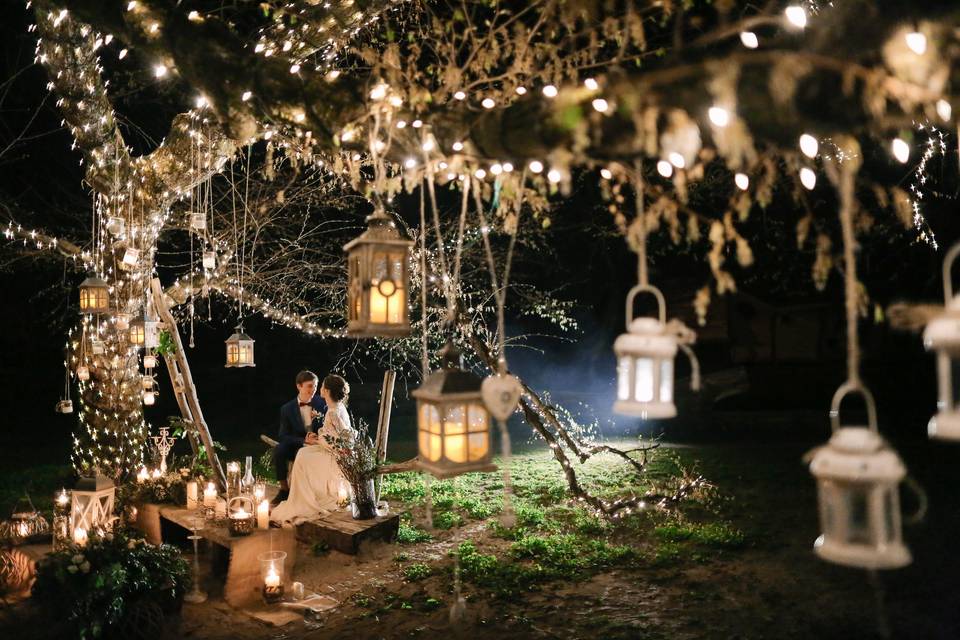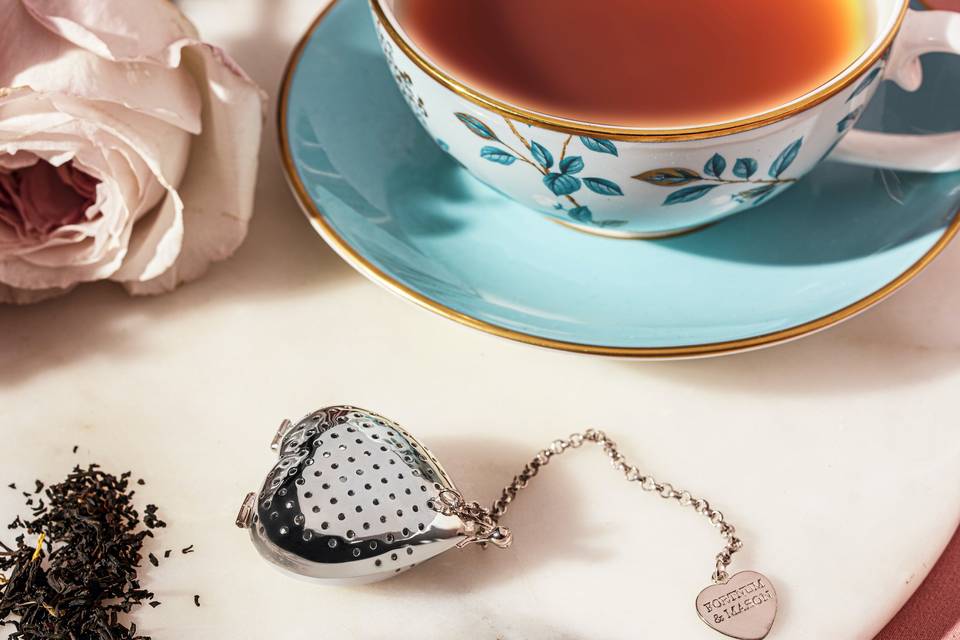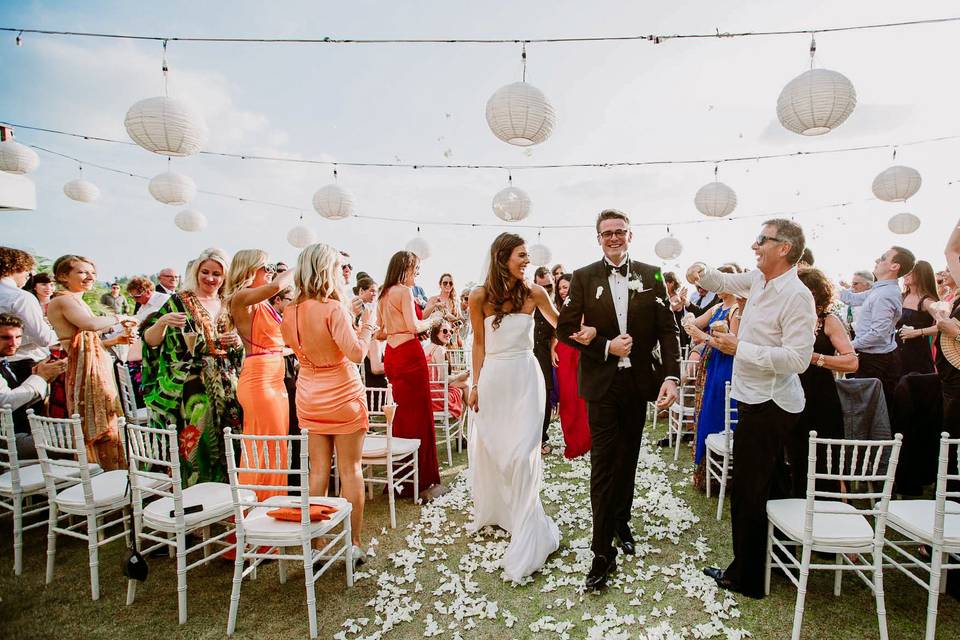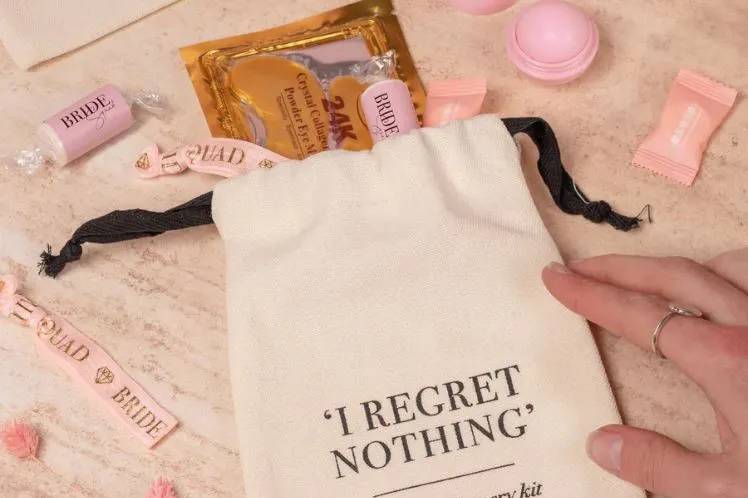Order of Speeches at a Wedding: Who Says What & When?
Confused about the order of speeches at a wedding? We explain who says what and when in this comprehensive guide
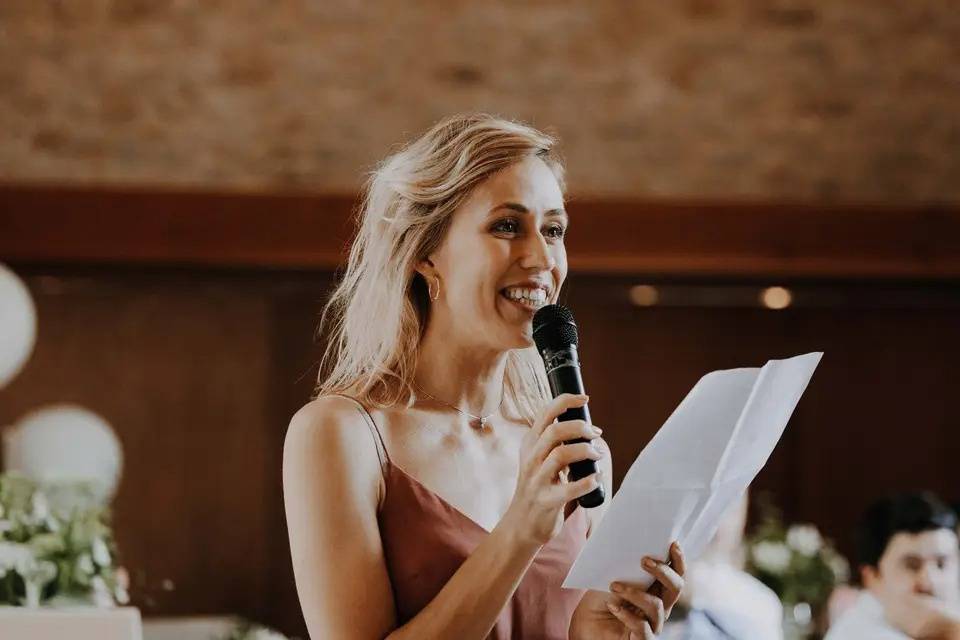

We always say there are no 'have tos' when it comes to weddings, you've got to do things the way you want to, but if you and your partner are after some guidance on the order of speeches at wedding celebrations, you've come to the right place.
The wedding speeches are usually given at a couples’ wedding reception, either before or after the meal, and getting the order of wedding speeches right will help ensure a smooth running of the day.
There are no set rules when it comes to the wedding speech order and who says what in wedding speeches, but there is a nack to ordering them in the most effective way.
The Order of Speeches At a Wedding: Who Says What & When?
To help you out, we spoke to Marc Blakewill from All Write on the Night who gave us a breakdown of when each speech should traditionally be, what it should include and the best time to have your speeches during the reception.
Here, you will find insight into the traditional order of speeches at a wedding, as well as information on who says what in each speech, and the best time to have your wedding speeches.
This truly is your one-stop-shop when it comes to wedding order of speeches, ready to get learning?
- What is the Order of Speeches at Wedding Celebrations?
- Who Says What in Each of the Wedding Speeches?
- When is the Best Time for Wedding Speeches?
- Expert Tips to Ensure Your Wedding Speeches Run Smoothly
Still looking for wedding speech tips and advice? Here are our top three tips for wedding speeches, in under one minute!
What is the Order of Speeches at Wedding Celebrations?
The traditional wedding speech order goes father of the bride, groom, best man and other toasts.
"In LGBTQ+ weddings, it is also common for both partners to speak but sometimes only one does," explains Marc. If you're having an LGBTQ+ wedding, you can decide on an order that works best for you. We've covered all the different ways LGBTQ+ couples can reinvent the speech section of their wedding.
"I would say the majority of speeches still follow this order. However, it’s now clear people also feel free to change it around," says Marc. Many brides now choose to give a speech, as do the bridesmaids or maid of honour.
"I’ve seen all sorts of combinations, including the best man starting and the groom coming last. Moreover, the roster of speakers is no longer 'the traditional three' but might also include the father of the groom, the mother of the bride, the maid of honour or the bride herself," Marc explains.
If you are including these, the order should go: father of the bride, groom, bride, bridesmaids/maid of honour, best man. But honestly, you can pick any order for your wedding speeches that works for you!
Who Says What in Each of the Wedding Speeches?
The order of wedding speeches is important, because each person (traditionally) is responsible for saying thank yous and making announcements within their speech. Here are the key things that you may want to include in each of the wedding speeches at your reception.
What Should the Father of the Bride Speech Say?
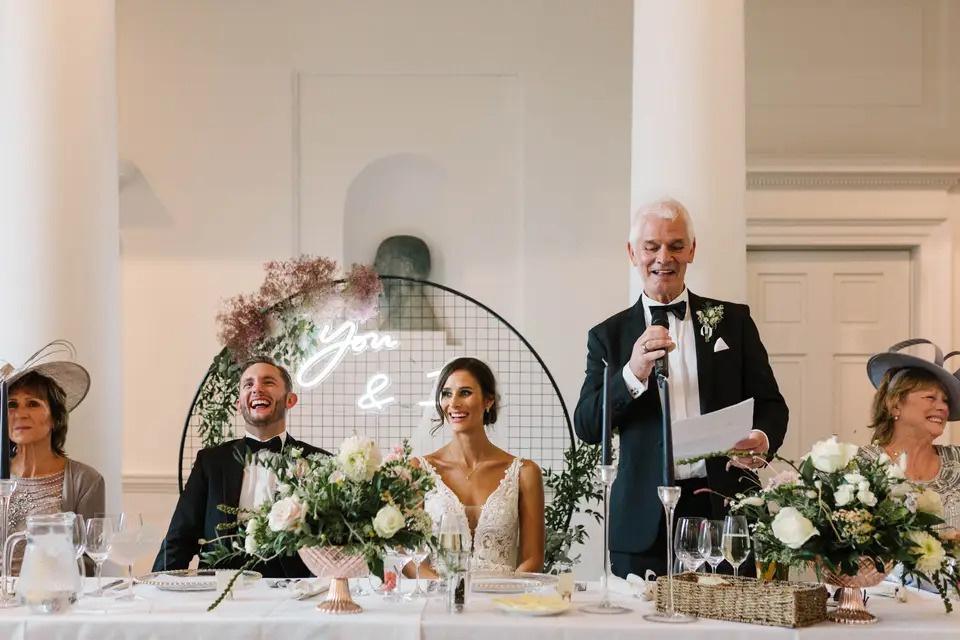
Kicking off the wedding speech order is the father of the bride speech. If the father of the bride isn’t present, this can be done by a close family friend.
The father of the bride should:
- Welcome the guests he is hosting and thank them for coming
- Welcome the bride's partner into the family and lead the toasts to absent friends and family
- Compliment the bride, tell some heartfelt stories about her and say how proud you are
- Praise the bride's partner and explain why you think they’re such a great couple
- Toast the newlyweds
The father of the bride shouldn't:
- Only include a list of thank yous - keep the speech witty and warm by adding a joke or two in among the thank yous
- Speak for too long - as you are likely to be the first speaker you want to ensure guests stay alert and eager for the speeches that follow
What Should the Groom’s Speech Say?
The father of the bride’s speech traditionally leads into the groom’s speech.
The groom should:
- Respond to the toast to the newlyweds by the father of the bride
- Thank the guests for attending and their gifts
- Thank both sets of parents
- Thank and say a few words about key members of the wedding party. Toast and compliment the bridesmaids here
- Toast their partner's parents if they are hosting
The groom shouldn't:
- Spend too much time thanking the venue - a quick line will be appreciated but any more can become clunky
- Give out gifts during the speech - this will take up time and can be done after the speeches or on the wedding morning
What Should the Best Man Speech Say?
The best man’s speech finishes off the wedding speeches – no pressure! The best man’s speech is traditionally expected to deliver the laughs so be sure to add in a few classic best man jokes.
The best man should:
- Echo the groom’s toast in thanking the bridesmaids
- Compliment the couple, particularly the groom's partner
- Tell anecdotes about the groom
- Read out messages from absent friends and family
- Lead a final toast to the happy couple
The best man shouldn't:
- Be too harsh - try not to give the newlyweds a roasting
- Mention the ex - stories about previous partners will often fall short and cause awkwardness
- Only include personal jokes - you might have a lifetime of drinking stories built up but remember to take the audience into consideration when you decide which stories to tell!
What Should the Bride’s Speech Say?
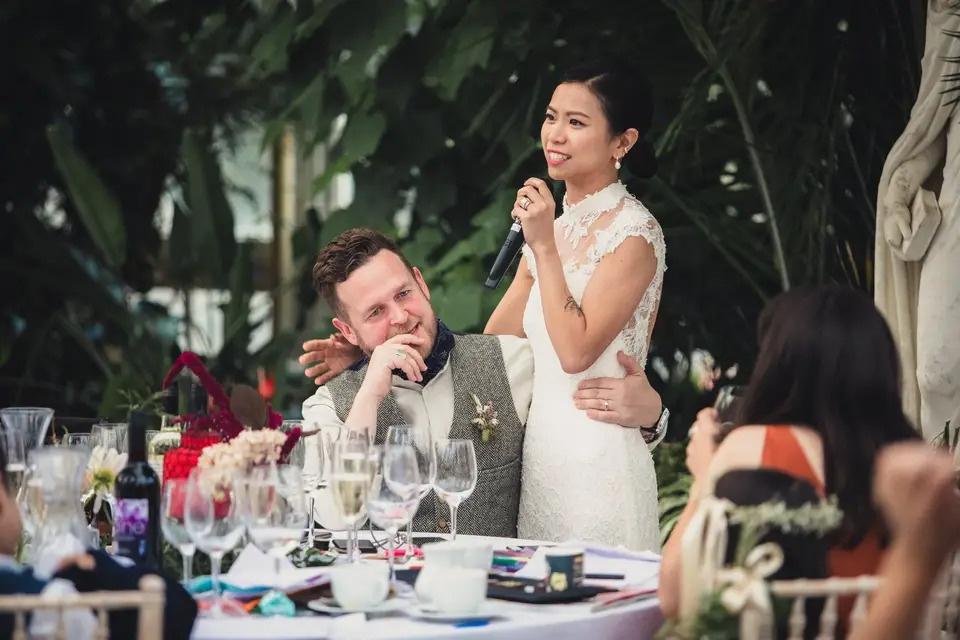
If the bride is going to give a speech, or to join the groom in a joint speech the bride should:
- Thank her guests for coming
- Thank her parents, especially if they are paying for the wedding
- Compliment her partner and tell a romantic/funny anecdote about them
- Raise a toast
What Should the Bridesmaid/Maid of Honour Speech Say?
Coming before the best man speech, this is a chance for the maid of honour to share her own funny anecdotes about the bride. The bridesmaids may like to share a short speech between them. Some are choosing to turn the maid of honour speech into a big occasion and prepare speeches, songs or videos that include all the bridesmaids and ushers.
The bridesmaids/maid of honour should:
- Thank the bride and offer a story or compliment
- Compliment the ushers
- Toast the newlyweds
When is the Best Time for Wedding Speeches?
Traditionally the wedding speeches take place after dinner, with the father of the bride occasionally giving his before the meal.
"The speeches are seen as a highlight - something to build up to – and therefore the meal is a good lead-in. Many couples tell me they want their guests to be 'fed and watered' before the speeches start so everyone can sit back, relax and enjoy them. The noise from the guests will then be laughter and applause not rumbling of stomachs," explains Marc.
Increasingly, couples are choosing to mix the wedding speech order up. It might be that you decide to do the speeches before the wedding breakfast so the speech-givers can then relax and enjoy the meal, or have a speech between each course so the guests don’t have to listen to a solid block of speeches.
If you decide to do this, chat to your wedding venue or caterers to make sure it's doable - you don't want to risk your meals going cold whilst someone talks for too long!
The best time for wedding speeches depends on the schedule of your day. Should you have a long gap between the ceremony and reception, your guests are unlikely to want to wait for their food until the end of the speeches. If you are having an informal meal like a buffet, there won’t be a chance for speeches during courses.
Most couples choose to have speeches after dinner when everyone is satisfied and has had a chance to relax.
Expert Tips to Ensure Your Wedding Speeches Run Smoothly
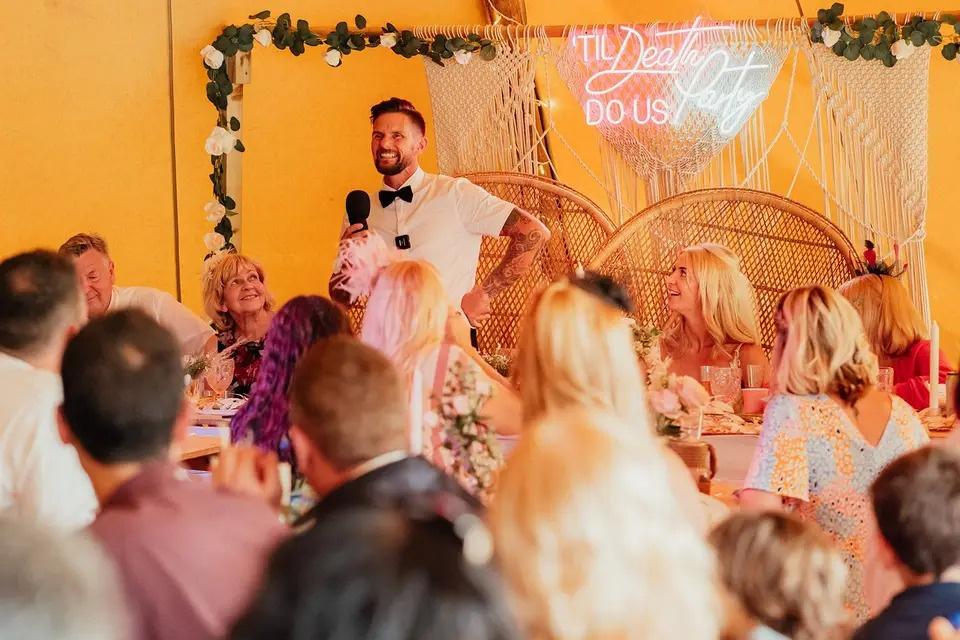
When deciding your wedding speech order, whether you go traditional or not, there are a few important things to consider.
1. Think about how the person before you will end their speech. If they let you know, you can then alter your speech so it starts referencing the ending of theirs.
2. Set time limits. "For example, if you allot 10 minutes maximum to the best man he’s unlikely to speak for half-an-hour. If he goes over with, say, 15 minutes, you’ll still largely be on schedule. Be realistic though. It’s actually harder for a speaker to write and deliver a great short wedding speech, than a standard length one of 7-8 minutes," says Marc.
3. Ask the person before you to introduce you. This saves you from having to clumsily introduce yourself to the room and lets you know when it’s okay to start your speech.
4. Don't have too many speakers. "If you break the mould of having more than the traditional three speakers, where do you stop? Be strict with numbers," suggests Marc.
5. Ask the other speech-givers what jokes, toasts, anecdotes and thank yous they plan on including in their speeches. That way you can make sure you don’t repeat them and can mix it up a bit so you can do different ones. You don’t want to bore the guests by repeating familiar stories.
6. Consider a master of ceremonies/toastmaster. Marc recommends this as, " they can ensure the speeches start at the appointed time and that the transition from one speech to another is done seamlessly. You must factor in that their opening and introductions to each speaker will add time to the overall wedding speech timetable or give less time to each speaker."
Don’t miss our guide to managing wedding speech nerves if you feel stressed about giving your speech. We also have nine tips for how to deliver an amazing wedding speech

